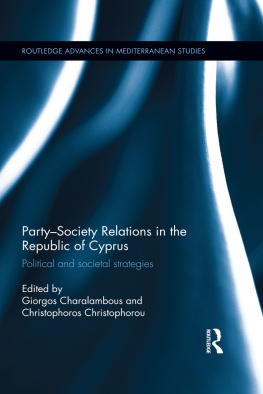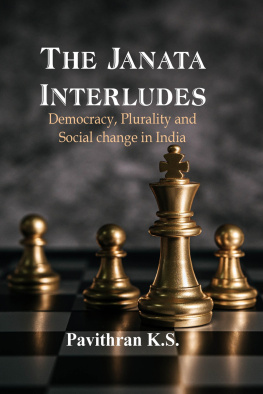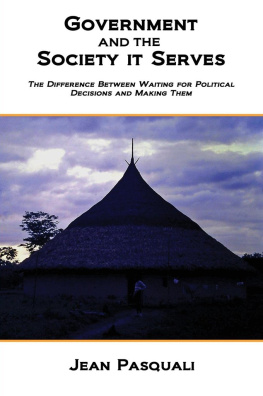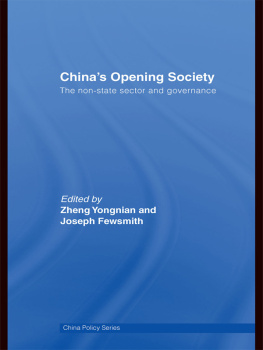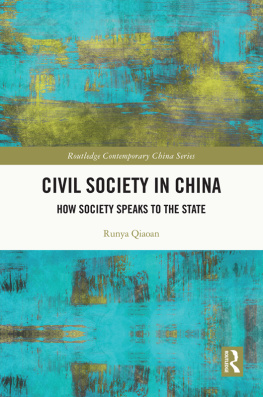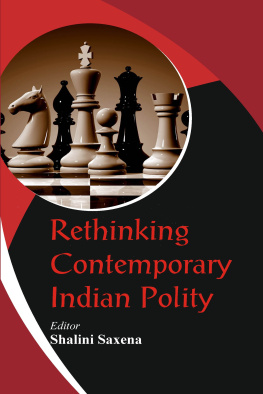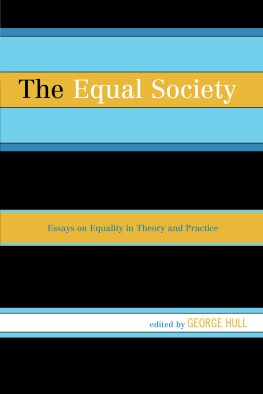Contents
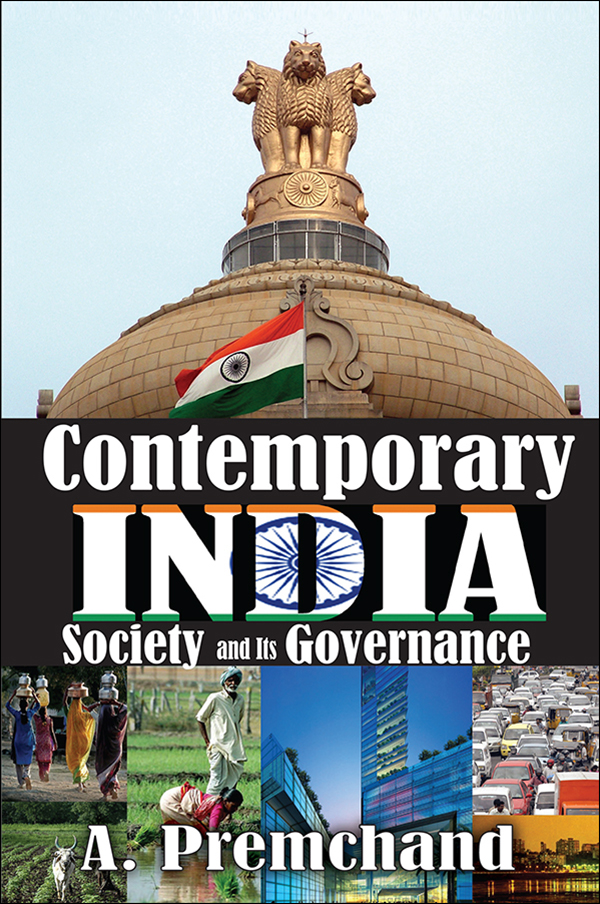
Contemporary
INDIA
Contemporary
INDIA
Society and Its Governance
A. Premchand

First published 2010 by Transaction Publishers
Published 2017 by Routledge
2 Park Square, Milton Park, Abingdon, Oxon OX14 4RN
711 Third Avenue, New York, NY 10017, USA
Routledge is an imprint of the Taylor & Francis Group, an informa business
Copyright 2010 by Taylor & Francis.
All rights reserved. No part of this book may be reprinted or reproduced or utilised in any form or by any electronic, mechanical, or other means, now known or hereafter invented, including photocopying and recording, or in any information storage or retrieval system, without permission in writing from the publishers.
Notice:
Product or corporate names may be trademarks or registered trademarks, and are used only for identification and explanation without intent to infringe.
Library of Congress Catalog Number: 2010011795
Library of Congress Cataloging-in-Publication Data
Premchand, A., 1933
Contemporary India : society and its governance / A. Premchand.
p. cm.
Includes bibliographical references and index.
ISBN 978-1-4128-1318-1 (alk. paper)
1. India--Politics and government--1977- 2. India--Social conditions--1947- I. Title.
JQ231.P74 2010
320.954--dc22
2010011795
ISBN 13: 978-1-4128-1318-1 (hbk)
In Thought Faith In Word Wisdom
In Deed Courage In Life Service
So May India be Great
Inscription on the Jaipur Pillar,
Rashtrapati Bhavan, New Delhi
Audite et alteram partem
(Listen also to the other side)
Medieval European proverb, above the
entrance to the Town Hall, Market Square, Gouda,
The Netherlands
Acknowledgements
Several non-financial debts were incurred in the process of writing this book. The author remains immensely grateful to the prompt and kind help despite a spatial difference of more than ten thousand miles and a time difference of about fourteen hours provided by M. Govinda Rao and Y. V. Reddy. Although they were extremely busy with their own daily official tasks, they were always prompt in responding to my requests for the supply of books and documents. But for their help this project would not have been launched.
Much of the work is based on a field study of a few villages in Krishna District, Andhra Pradesh. The villagers, who often wondered why a senior citizen living in a far-off land should be so persistent in his inquiries into their lives, were kind, patient, and frank in sharing their thoughts with the author. These discussions provided the basis for the description of the ground realities contained in the book. The author remains very grateful to them too.
is an expanded version of an article that was published in the Economic and Political Weekly (January 2007). Thanks to the editor for allowing me to reproduce parts of that article.
This is the third book project in which Arthur Monteiro has collaborated with me. He was immensely patient in transcribing my handwritten pages into an electronic typescript. His help at every stage of the preparation of the book is gratefully acknowledged and appreciated.
I owe heartfelt thanks to Professor Irving Louis Horowitz, Mary Curtis, and Laurence Mintz of Transaction Publishers for their advice and support.
Contents
List of Tables
Preface
If you wish to know your past life, look to your present circumstances; if you wish to know your future life, look to your present actions.
Buddhist saying
Soon after independence, in its tryst with destiny, the Indian political leadership decided to pursue four self-stipulated goals: to attain an improved standard of living through higher rates of growth, to establish a functioning political democracy, to achieve social equality through social re-engineering, and to make a quick transition in making government a servant of the public rather than being its master, as was the case during the previous colonial regime. This book is concerned with the journey from the past to the present in the articulation of more detailed goals and the difficulties encountered in achieving them. Specifically, it deals with the last three goals. While economic growth is important, much has been written on the subject and no attempt is made to deal with that although many of the developments in the other three spheres are dependent, to some extent, on economic development and related stability. Its impact on the other three spheres is, however, always kept in view.
In a book published a century ago, Arthur Bentley (The Process of Government: A Study of Social Pressures; originally published by the University of Chicago Press, reissued by Transaction Books, NJ, 2008), hoping to fashion a tool, wrote about the impact of social pressures on the working of the government. It was his view that all politics and all government are the result of the activities of groups. He also held that any other attempt to explain politics and government was doomed to failure. The approach in this book is an extension of Bentleys views and is based on the belief that there is at work a principle of reciprocal causation between society and government. What society wants becomes a mandate for the government. Government, in turn, is not a disinterested party, and its actions, and failure to act, have an immense impact on the working of society. Indeed, it can be asserted that there is no aspect of civic life that is immune to governmental actions. It is this relationship between government and society that is given intensive examination in this book. More specifically, the relationship between government and Indian society during the last six decades is subjected to detailed review.
Any study engaged in the analysis of the trends in the relationship between society and government has, of necessity, to look beyond the administrative aspect and probe into the sociological and legal aspects of the functioning of society. Sociological analyses are, in general, based on field studies and involve the issue of detailed questionnaires and analysis of the opinions expressed in the responses. Thereafter, the analysts return to their academic sanctuaries and engage in writing books that conform to the academic tradition. The writing of this book, too, is based on a field study but with a difference. It is based on direct observation and oral discussion with the focus groups. The author of this book has spent four months in a field study (during 2007-2008) of selected groups of a few villages of Krishna District of Andhra Pradesh. The reason for the selection of this area was nothing but familiarity and convenience. The author was born and brought up in a hamlet in coastal Andhra and has been visiting, at least once a year, the villages selected for the purpose of this study during the last six decades. Thus, the continuous association and participation in rural life and the discussions held with the focus groups have enabled this study, which aims at furnishing a landscape from ground up and not top down.
Recent literature on India, which has been both profound and prolific, has mostly dealt with the economic developments, geopolitical challenges, ecological issues, and the immense contributions made in the information technology sector. The analysis in this book is different both in scope and content from those studies. A study of the relationship between society and its government reveals that many of the measures taken by government have several unintended consequences that frequently have the effect of subverting the very intent of the policies. The analysis in what follows reveals many unpleasant facts and aspects that were hitherto unseen in the mirror.




